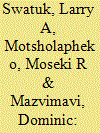|
|
|
Sort Order |
|
|
|
Items / Page
|
|
|
|
|
|
|
| Srl | Item |
| 1 |
ID:
189878


|
|
|
|
|
| Summary/Abstract |
Post–World War II thinking about security, prosperity, and development emphasized macro-level explanations, applied across widely varied temporal and spatial scales. Western scholars of International Relations (IR) were preoccupied with questions of strategic balance and world order, typically focusing on possibilities for war and peace through one of two lenses, Realist or Idealist. Similarly, challenges of prosperity and development were understood in competing “modernization” or “dependency” terms, where “underdevelopment” was seen as the product of either “backward” states or an exploitative world system. In almost every case, the unit of analysis was the sovereign state operating in an anarchical inter-state (or international) system. Over time, many came to perceive these dominant explanations of (dis)order not only as deficient analytically but harmful in practice. Put differently, the actual course of world events rarely, if ever, matched the outcomes expected by the theorists.
|
|
|
|
|
|
|
|
|
|
|
|
|
|
|
|
| 2 |
ID:
105406


|
|
|
|
|
| Publication |
2011.
|
| Summary/Abstract |
Using a political ecology framework, this article describes the main developmental challenges facing communities living within the Boteti River sub-basin of northwestern Botswana. The data derive primarily from household surveys conducted over several months in 2008. They show that residents within the study area face significant challenges from unstable supplies of potable water and a highly degraded physical landscape. The article suggests that new opportunities for improved livelihood security have arisen with the recent return of the river to a perennial condition. For more than two decades, only a small portion of the river has had significant surface flow, with the rest dry year round. Given the area's proximity to landscape-dependent, wildlife-based tourism activity, the article suggests that the shifting basin hydrology presents sport-for-development agents with numerous opportunities for meaningful development interventions. In elaborating on what Coalter calls 'sport plus' and' plus sport activities', the article cautions that rural development undertaken in a context of abiding structural marginalisation is not for the faint of heart. Meaningful participation requires strategic intervention and long-term commitment of resources.
|
|
|
|
|
|
|
|
|
|
|
|
|
|
|
|
| 3 |
ID:
047310


|
|
|
|
|
| Publication |
New York, Palgrave, 2001.
|
| Description |
xviii, 300p.
|
| Standard Number |
0333802764
|
|
|
|
|
|
|
|
|
|
|
|
Copies: C:1/I:0,R:0,Q:0
Circulation
| Accession# | Call# | Current Location | Status | Policy | Location |
| 044786 | 320.968/VAL 044786 | Main | On Shelf | General | |
|
|
|
|
| 4 |
ID:
189879


|
|
|
|
|
| Summary/Abstract |
No matter how narrowly you focus your spatial or temporal lenses, you are bound to catch sight of multiple significant challenges to human community. Many of these challenges are shared, such as Covid-19, though their impacts on individuals and groups are felt unevenly. Some challenges are immediate and existential, such as the wars in Ukraine, Syria, and Yemen. Others, such as race, gender, caste, and class-based inequalities, are deeply embedded in social structures, providing privilege and persecution, and reward and oppression in unequal measures. And climate change, though slower moving, holds out the prospect of leading to total social collapse. How to make sense of these dramatic changes? This essay explores the adequacy of theories of IR and G/IPE in explaining the emergent world (dis)order. It argues that, whether orthodox or critical, theory must find a way to centre humanity within the biosphere if theory is to adequately inform practice.
|
|
|
|
|
|
|
|
|
|
|
|
|
|
|
|
|
|
|
|
|